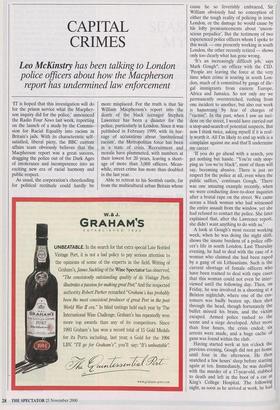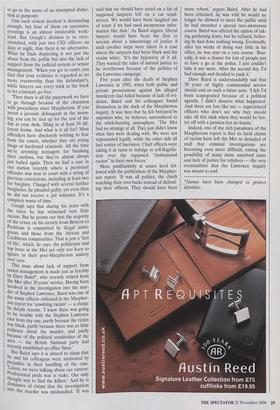CAPITAL CRIMES
Leo McKinstry has been talking to London
police officers about how the Macpherson report has undermined law enforcement
`IT is hoped that this investigation will do for the prison service what the Macpher- son inquiry did for the police,' announced the Radio Four News last week, reporting on the launch of a study by the Commis- sion for Racial Equality into racism in Britain's jails. With its characteristic self- satisfied, liberal piety, the BBC current affairs team obviously believes that the Macpherson report was a great success, dragging the police out of the Dark Ages of intolerance and incompetence into an exciting new era of racial harmony and public respect.
As usual, the corporation's cheerleading for political rectitude could hardly be more misplaced. For the truth is that Sir William Macpherson's report into the death of the black teenager Stephen Lawrence has been a disaster for the police, particularly in London. Since it was published in February 1999, with its bar- rage of accusations about 'institutional racism', the Metropolitan force has been in a state of crisis. Recruitment and morale have plummeted, with numbers at their lowest for 20 years, leaving a short- age of more than 3,000 officers. Mean- while, street crime has more than doubled in the last year.
Able to retreat to his Scottish castle, far from the multicultural urban Britain whose cause he so feverishly embraced, Sir William obviously had no conception of either the tough reality of policing in inner London, or the damage he would cause by his lofty pronouncements about 'uncon- scious prejudice'. But the testimony of two experienced police officers whom I spoke to this week — one presently working in south London, the other recently retired — shows only too clearly what has gone wrong.
`It's an increasingly difficult job,' says Mark Gough*, an officer with the CID. `People are leaving the force at the very time when crime is soaring in south Lon- don, much of it committed by gangs of ille- gal immigrants from eastern Europe, Africa and Jamaica. So not only are we permanently overstretched, rushing from one incident to another, but also our work is hamstrung by fear of charges of "racism". In the past, when I saw an inci- dent on the street, I would have carried out a stop-and-search of potential suspects. But now I think twice, asking myself if it is real- ly worth it. All I'm likely to end up with is a complaint against me and that'll undermine my career.
`If you do go ahead with a search, you get nothing but hassle. "You're only stop- ping us 'cos we're black", most of them will say, becoming abusive. There is just no respect for the police at all, even when the public suffers,' continues Gough. 'There was one amazing example recently, when we were conducting door-to-door inquiries after a brutal rape on the street. We came across a black woman who had witnessed the entire assault from the window, yet she had refused to contact the police. She later explained that, after the Lawrence report, she didn't want anything to do with us.'
A look at Gough's most recent working week, when he was doing the night shift, shows the insane burdens of a police offi- cer's life in south London. Last Thursday evening, he had to deal with the case of a woman who claimed she had been raped by a gang of six Lithuanians. Such is the current shortage of female officers who have been trained to deal with rape cases that this woman could not even be inter- viewed until the following day. Then, on Friday, he was involved in a shooting at a Brixton nightclub, where one of the cus- tomers was badly beaten up, then shot through the head, though fortunately the bullet missed his brain, and the victim escaped. Armed police rushed to the scene and a siege developed. After more than four hours, the crisis ended; six arrests were made, and a huge cache of guns was found within the club.
Having started work at ten o'clock the previous evening, Gough did not get home until four in the afternoon. He then snatched a few hours' sleep before starting again at ten. Immediately, he was dealing with the murder of a 17-year-old, stabbed to death and left in the boot of a car at King's College Hospital. The following night, as soon as he arrived at work, he had to go to the scene of an attempted abduc- tion at gunpoint. One such violent incident is demanding enough, but four of them on successive evenings is an almost intolerable work- load. But Gough's division is so over- stretched, with just two CID officers on duty at night, that there is no alternative. What he finds dispiriting is not just the abuse from the public but also the lack of support from the judicial system or senior management. 'When you get to court, you find that your evidence is regarded as no more trustworthy than the defendant's, while lawyers use every trick in the book to let criminals go free. `Then there is all the paperwork we have to go through because of the obsession with procedures since Macpherson. If you arrest a juvenile delinquent in the morn- ing, you can be tied up for the rest of the day at your desk, filling in at least 50 dif- ferent forms. And what is it all for? Most offenders have absolutely nothing to fear from the courts, whether they are young thugs or hardened criminals. All the time we're arresting teenagers for breaking their curfews, but they're almost always just bailed again. Then we had a case in our station recently where a persistent offender was sent to court with a string of previous convictions, including at least two for burglary. Charged with several further burglaries, he pleaded guilty; yet even then he did not receive a jail sentence. It's a complete waste of time.'
Gough says that during his years with the force he has witnessed very little racism. But he points out that the majority of the crime on his stretch from Brixton to Peckham is committed by illegal immi- grants and those from the African and Caribbean communities. That is just a 'fact of life', which, he says, the politicians and top brass at the Met are only too keen to ignore in their post-Macpherson anxiety over race.
This issue about lack of support from senior management is made just as forcibly by Dave Baird*, who recently retired from the Met after 30 years' service. Having been involved in the investigation into the mur- der of Stephen Lawrence, Baird was one of the many officers criticised in the Macpher- son report for 'unwitting racism' — a charge he deeply resents. 'I knew there was going to be trouble with the Stephen Lawrence Case from day one, partly because the victim was black, partly because there was so little evidence about the murder, and partly because of the political sensitivities of the area the British National party had recently established an office there.' , But Baird says it is absurd to claim that he and his colleagues were motivated by prejudice in their handling of the case. Listen, we were talking about our careers. Professional pride was at stake. Our only thought was to find the killers.' And he is dismissive of claims that the investigation into the murder was mishandled. 'It was said that we should have acted on a list of supposed suspects left on a car wind- screen. We would have been laughed out of court if we had used anonymous infor- mation like that.' As Baird argues, liberal lawyers would have been the first to scream about a miscarriage of justice if such cavalier steps were taken in a case where the suspects had been black and the victim white. 'It's the hypocrisy of it all. They wanted the rules of natural justice to be overthrown because of the politics of the Lawrence campaign.'
Five years after the death of Stephen Lawrence in 1993, when both public and private prosecutions against his alleged murderers had failed because of lack of evi- dence, Baird and his colleagues found themselves in the dock of the Macpherson inquiry. It was then that he felt betrayed by superiors who, he believes, surrendered to the witch-hunting atmosphere. 'The Met had no strategy at all. They just didn't know what they were dealing with. We were not represented legally, while the other side all had armies of banisters. Chief officers were taking it in turns to indulge in self-flagella- tion over the supposed "institutional racism" in their own forces.'
More pusillanimity at senior level fol- lowed with the publication of the Macpher- son report. 'It was all politics, the chiefs watching their own backs instead of defend- ing their officers. They should have been more robust,' argues Baird. After he had been criticised, he was told he would no longer be allowed to meet the public until he had attended a special race-awareness course. Baird was offered the option of tak- ing gardening leave, but he refused, believ- ing he had done nothing wrong. Eventually, after ten weeks of doing very little in his office, he was sent on a race course. 'Basi- cally, it was a chance for lots of people just to have a go at the police. I just couldn't take it any more. After the second day, I'd had enough and decided to pack it.'
Dave Baird is understandably sad that 30 years of highly commended service should end on such a bitter note. 'I felt I'd been scapegoated because of a political agenda. I didn't deserve what happened. And there are lots like me — experienced officers who don't see why they should take all this stick when they would be bet- ter off with a pension but no hassle.'
Indeed, one of the rich paradoxes of the Macpherson report is that its lurid claims of racism have left the Met so denuded of staff that criminal investigations are becoming even more difficult, raising the possibility of many more unsolved cases and lack of justice for relatives — the very eventualities that the Lawrence inquiry was meant to end.
*Names have been changed to protect identities.






























































































 Previous page
Previous page